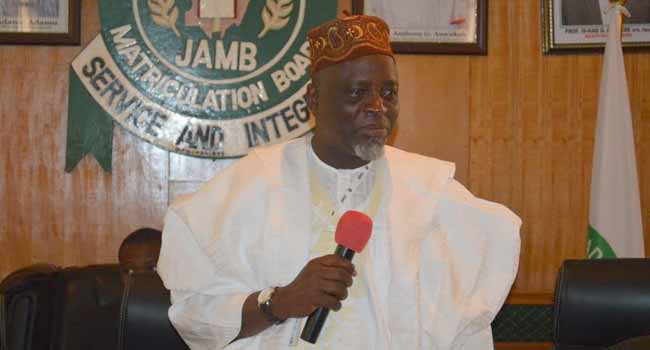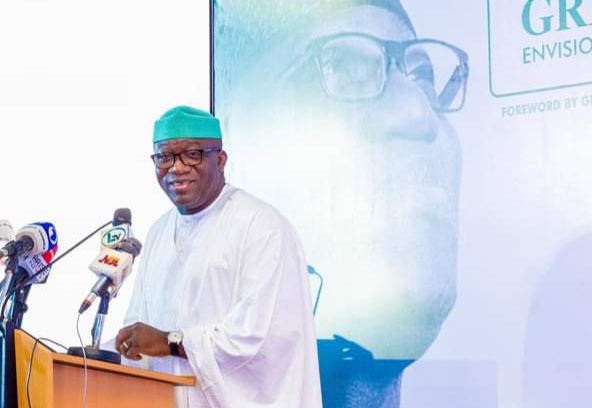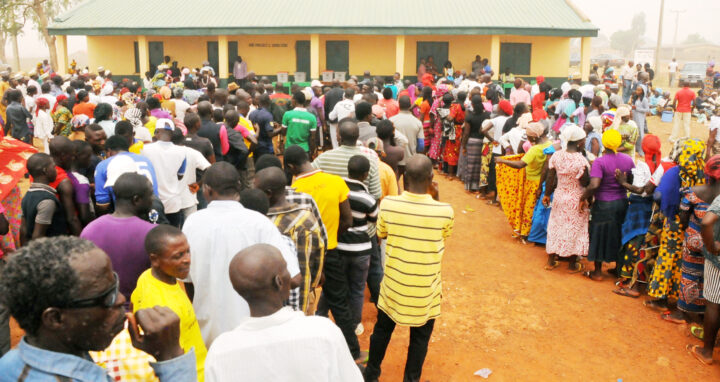File photo of applicants trying to submit their test questions to an immigration officer
BY EBENEZAR WIKINA AND CHARLES ASIEGBU
Youth unemployment is a significant problem in Nigeria. Successive administrations have adopted the mantra of job creation as a cornerstone of their economic policy. However, the turnout of their avowed commitment to curbing unemployment leaves much to be desired. With an estimated 1.8 million people entering the labour market every year in Nigeria, tackling unemployment would require more than just promises. But that’s not the whole story.
Generally speaking, unemployment is also an Africa-wide challenge. Projections have shown that the continent’s share of the world’s population will grow from one-fifth to one-third by 2050. Put differently, almost 16 million Africans were facing unemployment in 2019, which is even more alarming when you consider that the median age on the continent is 19.7 years; so many young people without jobs are indeed a recipe for disaster. Nigeria currently ranks 3rd on the list of African nations with the highest unemployment rate. This is not to be so. Given our rich pedigree, it negates the hard work Nigerians represent. According to the Migration Policy Institute, 61 percent of Nigerians over the age of 25 in the United States hold at least a bachelor’s degree, compared to 32 percent of United States citizens – yeah, that’s how educated we are!
Similarly, among Nigerian-American professionals, 45 percent work in education services. In addition, many Nigerian Americans are becoming entrepreneurs and CEOs, building tech companies in the United States. However, in Nigeria, Nigerians are educated but largely unemployed or underemployed. A startling reality is that the combined number of employed persons who are extremely or moderately poor is 67 percent in 2022. This means that at least two-thirds of the employed people in Nigeria are poor.
Advertisement
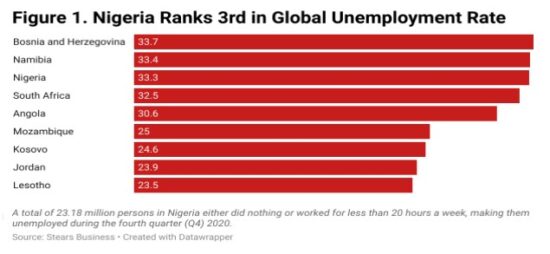
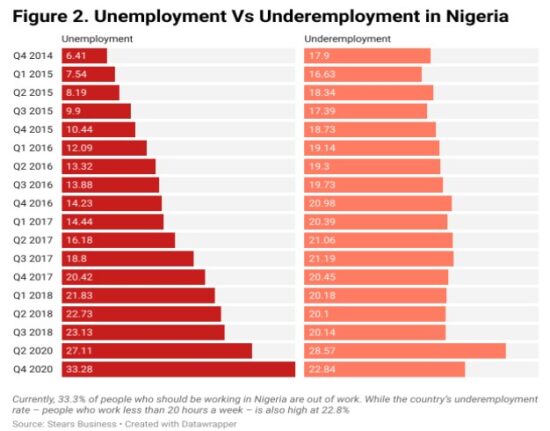
Businesses are yet to recover from the pandemic’s effects. According to the Nigeria Employers’ Consultative Association (NECA), firms are reportedly struggling to keep employees on their payrolls because of the financial hardship caused by the COVID-19 pandemic. Some businesses manage to pay half of their employees’ salaries, while others have stopped hiring, thereby dashing the aspirations of graduates and job seekers.
Advertisement
Formal education in the mud
According to a United Nations report, education provides a platform for cognitive skills, fundamental competencies and positive values essential for community and national development. Beyond the stated importance of education, it is primarily seen as a channel to earn a decent living. Unfortunately, arguments are rife that an educated Nigerian is more likely to be unemployed than the average Nigerian – and the likelihood that you have a job is lower if you have gone to university. Education no longer assures a secure means of livelihood and future in Nigeria. While Nigeria’s labour force increased by nearly 4 percent between 2010 and 2017, job growth was 1.6 percent during the same period.
Formal education may be necessary, but education in Nigeria is steadily becoming unattractive, given the lack of jobs. The problem lies with the slow rate at which the Nigerian economy creates formal jobs. For instance, approximately 251,000 routine jobs were created in 2015 alone, whereas popular estimates show that Nigerian universities produce around 500,000 graduates annually.
The biggest hit is on Nigerians who pay exorbitant tuition outside Nigeria to gain relevant education and exposure. A Nigerian student in the United Kingdom pays an average of $35,710 per year as of 2015 (including tuition and living expenses). According to one estimate, Nigerian parents spend more than half of the federal government’s annual budget of $750 million on their children’s education in the United Kingdom. The average tuition cost in the United Kingdom is £22,200 or ($31,380) per year.
Advertisement
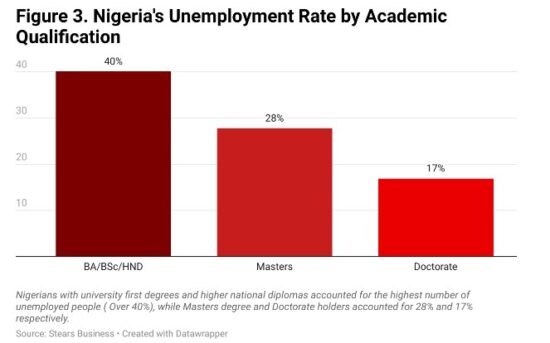
Creative Hustle to the Rescue
Years ago, Naeto C, a Nigerian musician, retorted that he was the only “MC with an MSc” in his music. Yet, many years later, Nigeria’s creative sector has grown exponentially and is saturated with highly educated people.
Advertisement
The creative industry appears to be alleviating the unemployment situation in Nigeria. The industry is even more alluring with the successes recorded by our artists. Nigerian artists have benefited tremendously through streaming and online purchases (for instance, Wizkid’s duet with Tems, ‘Essence’, attained platinum status in the US and UK in 2021). For instance, music streaming in Nigeria accounts for more than half of the global music industry’s revenue.
Interestingly, global internet video subscriptions increased by 26% from 2019 to 1.1 billion in 2020.
Advertisement
According to a study, the creative sector employs 4.2 million people across five sectors, including media, entertainment, beauty, lifestyle, and visual arts. Good a thing; this industry is vibrant and mainly driven by young people. President Muhammadu Buhari says the creative sector is expected to contribute $10 billion to the country’s gross domestic product (GDP). Additionally, the industry is projected to contribute N5 trillion to the country’s GDP.
However, while there are calls for more Nigerians, especially women, to develop an interest in the space – the industry is not maximizing its growth potential. The Bank of Industry (BOI) and the Central Bank of Nigeria (CBN) have made concerted efforts to support the sector in the past. Still, there is a dire need to accelerate and upscale programs to cover more grounds as our population surges. There are also concerns about the government’s inadequate commitment to contain what we refer to in our local parlance as “The Nigerian factor” alongside issues like piracy and access to funding flaws these efforts.
Advertisement
Conclusion
With little or no support from the government, the creative sector has turned out to be one of Nigeria’s largest export. With the liberalized and enlarged market presented by the African Continental Free Trade Agreement (ACFTA), the coast is clear for a repositioned industry that can become the leading hub in Africa and the world. Currently, the social protection plan in Nigeria is in its nascent stages. Many programs are classified under social security today in Nigeria; however, their overall coverage and effect on welfare are minimal. Therefore, the government has a critical role in charting a new course by creating adequate social safety nets for the creative industry.
Advertisement
Recommendations
- Nigeria’s formal education curriculum must be urgently revised to meet the demands of the job market.
- Government should create policies and initiatives that support innovation and expansion in the creative sector. Grants, low-interest loans, tax breaks, and the promotion of locally produced material can all be used to implement this policy.
- The government and relevant stakeholders should consider social safety nets for freelance and informal sectors.
- The government must uphold merit, transparency, efficacy, and orderliness when implementing programs to help the informal sector.
- Members of the creative sector must leave nothing to chance in seeking more robust policies, welfare and protection for the industry.
Wikina and Asiegbu are both Bridge Fellows of the Nigerian Economic Summit Group (NESG). Asiegbu currently works as a senior policy research analyst at The Nextier Group and Winika is the founder of Policy Shapers
Views expressed by contributors are strictly personal and not of TheCable.
Add a comment

